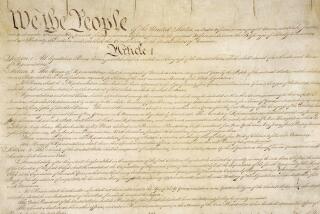Letters: Before and after the Constitution
- Share via
Re “The audacity of democracy,” Opinion, Sept. 16
Akhil Reed Amar’s breathless encomium to the U.S. Constitution misunderstands the nature of the new government created 225 years ago.
Far from being the world’s first democratic country, the U.S. was still a decentralized confederation. The federal government could do little to end slavery, leaving it up to the states to decide whether they would emancipate African Americans. Nor could it restrain states like Georgia from dispossessing the Native Americans. And even the Bill of Rights did nothing to protect citizens from the depredations of state governments, for the first 10 amendments only limited the power of the federal government.
Nor is Amar’s story of a gradual expansion of democratic rights under the Constitution convincing. It took a bloody Civil War to alter the flawed regime created by the framers in 1787 and to begin the still-incomplete process of extending equal rights to all Americans.
Craig Yirush
Long Beach
The writer is an associate professor of history at UCLA.
Amar writes: “Before the American Revolution, no regime in history — not ancient Athens, not republican Rome, not Florence nor the Swiss nor the Dutch nor the British — had ever successfully adopted a written constitution by special popular vote.” This is an overstatement.
It isn’t difficult to find examples contradicting Amar. For instance, during the 5th century BC, the Roman republic prepared and adopted via popular assent the Laws of the 12 Tables. These laws were prepared by a commission of 10 individuals, were obeyed by both the patricians and the plebeians, and were accessible to every citizen.
Paolo Giacomoni
Palos Verdes Peninsula
To have the Constitution’s 225th anniversary fall during such a zany presidential campaign seems a bit surreal.
It’s fine that the two major parties offer contrasting visions for our country’s future. The constitutional line is crossed, however, when one party underscores the dearth of references to God in the other’s platform and otherwise avers that its candidate is more a man of faith than his opponent.
This shameful tactic ignores what the Constitution’s framers took care to emphasize: that “no religious test shall ever be required as a qualification” for public office.
Betty Turner
Sherman Oaks
The Constitution as well as the Declaration of Independence were forged through cooperation and compromise by people with very different points of view. It is ironic that if today’s “tea party,” with its philosophy of no compromise, had been in charge in the 1700s, these sacred documents might never have been created.
So much for “taking us back to our roots.”
Steve Mehlman
Beaumont
ALSO:
Letters: Cracks in L.A.’s infrastructure
Letters: Digging into Romney’s tax plan
More to Read
A cure for the common opinion
Get thought-provoking perspectives with our weekly newsletter.
You may occasionally receive promotional content from the Los Angeles Times.






